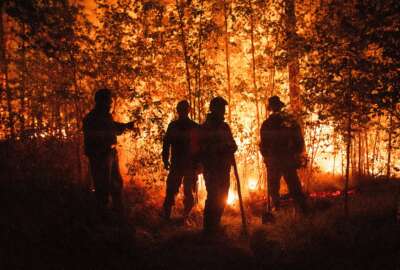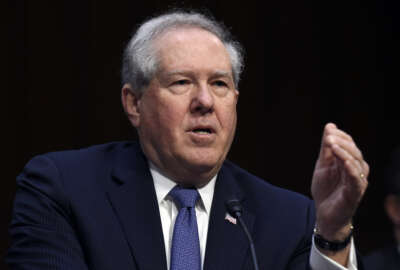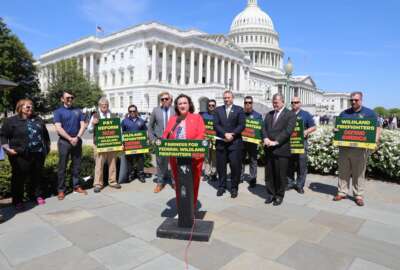The Forest Service introduces minority students to woodland firefighting
The U.S. has experienced a hot summer so far. Yet one group of students from Historically Black Colleges and Universities (HBCUs), are spending their time in heavy...
The U.S. has experienced a hot summer so far. Yet one group of students from Historically Black Colleges and Universities (HBCUs), are spending their time in heavy gear, learning to fight wildfires. It is part of a partnership between the U.S. Forest Service and a group of four HBCUs. For details, Federal Drive with Tom Temin spoke with the National Diversity Student Programs Manager, Stephanie Love.
Interview Transcript:
Tom Temin First, let’s talk about what these students are doing this summer and about this program.
Stephanie Love Absolutely. So having a pipeline of students pursuing an education in forestry and fire is crucial as the wildlife land fire crisis continues to rise. So we bring in a group of students from four HBCUs in the South. That’s Tuskegee University, Alabama A&M University, Southern University and Florida A&M University to train at the only onsite wildland fire academy hosted at an HBCU in the nation. And they get classes, certification opportunities and the opportunity to practice live fire before being released out into the world of work to pursue an internship after their training period is over. So they received their training by now and they’re all out working internships for the U.S. Forest Service.
Tom Temin Wow. So the training took place at one of the colleges. Which one and what kind of facilities does it have there?
Stephanie Love Alabama A&M University is the host university. They are the only SAF accredited forestry degree program at an HBCU in the nation. Ranked number nine out of all forestry schools in the nation. So it’s only right that we would be there. They have a research forest where we can put live fire on the ground and of course all of the academic facilities that we need to host an educational academy.
Tom Temin And this is a residency program that they had.
Stephanie Love They spent 28 days on campus and get a chance to live in the dorms, eat in the caf and study in the facilities, go out to the field, and the university hosted research sites.
Tom Temin Well, that must be some final exam to do. You have to put out a fire to be able to get your certification.
Stephanie Love Absolutely. Absolutely.
Tom Temin Now, in their internships, now, that’s what the status of these students is. Now, they are actually interns with the Forest Service?
Stephanie Love Yes. Most of them and some of them with private industry. We put them in a position where they compete well for any forestry or fire position that they want in the nation, whether it’s federal, of course, we want them to come and work for us, or private. So they’re all across the country, from Oregon all the way to North Carolina.
Tom Temin And are they all firefighting or they’re doing other things that might be related to forestry? Because there’s a lot of topics in forestry.
Stephanie Love Absolutely. Some of them are doing wildlife biology, some of them are doing soil science, some of them are doing forest inventory and forestry, but they all have a collateral duty of wildland firefighting. So when the time comes, they’re certified and ready to answer the call when dispatched to the fire.
Tom Temin We’re speaking with Stephanie Love. She is the National Diversity Student Programs manager at the U.S. Forest Service. And tell us more about the National Diversity Student Programs themselves. This one was firefighting. What are some of the other ones that you offer?
Stephanie Love Diversity is one of the core values of the U.S. Forest Service. And we recognize that we have an opportunity to do better in building diversity. Society of American foresters, according to them, African-Americans and Hispanics make up 1.9% and 3.6% of bachelor’s degrees in agricultural and natural resources sciences. So to help address this need, we have partnered with HBCUs in many areas, not just forestry and fire. In Special Uses administration, we have a similar camp that we invite students to participate in from any HBCUs. We have a full ride scholarship for the scholars who are eligible to pursue a career working for the great outdoors, but maybe not necessarily in the great outdoors, like computer science and accounting and business. Anything that you can think of that supports the mission critical occupations of our agencies. We have initiatives to support increased diversity in creating pipelines for these students to be employed by agency.
Tom Temin And I guess once they become employed, either, as you say, at the agency or at state agencies perhaps, or in industry because there’s a big industry around forestry. They can become maybe agents for people like them, to follow them into those fields.
Stephanie Love Absolutely. That that’s how I got here. 24 years ago, I came in through a scholars program as a forester and have moved around in the agency and found something that I really like to do, which is bring this whole thing full circle. And talking to students who were once like myself these are underrepresented careers, especially among people of color. Many of the students may have never heard of forestry or fire or recognize it as a career of choice. My mission is to outreach to create and increase awareness that working for the great outdoors is a career choice and an academic choice. And we’re getting super response from the student population.
Tom Temin And how many students go through the various programs in a given year and maybe give us a roll up of how many over the years that you have run through the program?
Stephanie Love Wow. Through the years, we have almost 200 students have come through these programs over the years. We host about 15 students per year in the Wildland Forestry and Fire program. And the special uses program is just getting ramped up and we hope to host about ten this year. So we’re on a roll.
Tom Temin And just defined for a special uses in the context of forestry.
Stephanie Love Permits have to be issued on national forest land for filming of movies and mining and mineral and root harvesting, Christmas tree harvesting, all of the wonderful natural resources and accesses to the national resource that we have on national forest lands have to go through a permitting process and that happens through our special uses division. That’s just another way that we continue to fully engage with the communities that we serve. We want to reflect the richness and diversity through about our agency and all the mission critical occupations that allow us to do business.
Tom Temin These programs are selective. That is to say you get more applicants than you can fit in each year.
Stephanie Love Yes, we do. We get more applicants than we can fit in each year, and it’s competitive. So there are GPA requirements for some of them. It is highly competitive.
Tom Temin Sure. How do you follow up after they leave the program and do you follow them throughout their early parts of their careers?
Stephanie Love Oh, yes. We’ve been tracking since the nineties and this particular program hasn’t been going on through the nineties, but we’ve had diversity initiatives that have been going on with partnerships with that agency since 1992. And we we’ve tracked every single student from all initiatives since 1992, including myself.
Tom Temin Yeah. So you’re a success story of this yourself?
Stephanie Love Absolutely.
Tom Temin Now you’ve got an administrative office type of job, though. Do you ever get out into the forest yourself once in a while and just hug a tree?
Stephanie Love Absolutely. Absolutely. I miss it so much. And programs like this give me the opportunity to share my experiences and create nostalgia for myself. I can go back in time when I was young, like the students and enjoying the outdoors, and I still do. So absolutely. I get out there every now and then.
Copyright © 2025 Federal News Network. All rights reserved. This website is not intended for users located within the European Economic Area.
Tom Temin is host of the Federal Drive and has been providing insight on federal technology and management issues for more than 30 years.
Follow @tteminWFED






